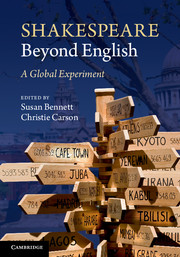Book contents
- Frontmatter
- Contents
- List of Illustrations
- List of colour plates
- Notes on contributors
- Foreword
- Acknowledgements
- Introduction
- The Globe to Globe Festival: An Introduction
- Performance Calendar
- Week One
- Week Two
- Chapter Seven Performing cultural exchange in Richard III
- Chapter Eight ‘A girdle round about the earth’
- Chapter Nine Intercultural Rhythm in Yohangza's Dream
- Chapter Ten Art of darkness
- Chapter Eleven Neo-liberal Pleasure, Global Responsibility and the South Sudan Cymbeline
- Chapter Twelve Titus in No Man's Land
- Chapter Thirteen Tang Shu-wing's Titus and the acting of violence
- Chapter Fourteen ‘A strange brooch in this all-hating world’
- Chapter Fifteen ‘We want Bolingbroke’
- Chapter Sixteen O-thell-O
- Week Three
- Week Four
- Week Five
- Week Six
- Afterwords
- Index
- Plate section
- References
Chapter Twelve - Titus in No Man's Land
The Tang Shu-wing Theatre Studio's Production
Published online by Cambridge University Press: 05 June 2014
- Frontmatter
- Contents
- List of Illustrations
- List of colour plates
- Notes on contributors
- Foreword
- Acknowledgements
- Introduction
- The Globe to Globe Festival: An Introduction
- Performance Calendar
- Week One
- Week Two
- Chapter Seven Performing cultural exchange in Richard III
- Chapter Eight ‘A girdle round about the earth’
- Chapter Nine Intercultural Rhythm in Yohangza's Dream
- Chapter Ten Art of darkness
- Chapter Eleven Neo-liberal Pleasure, Global Responsibility and the South Sudan Cymbeline
- Chapter Twelve Titus in No Man's Land
- Chapter Thirteen Tang Shu-wing's Titus and the acting of violence
- Chapter Fourteen ‘A strange brooch in this all-hating world’
- Chapter Fifteen ‘We want Bolingbroke’
- Chapter Sixteen O-thell-O
- Week Three
- Week Four
- Week Five
- Week Six
- Afterwords
- Index
- Plate section
- References
Summary
Frequently dubbed a ‘cultural desert’, Hong Kong is not typically associated with high art or theatrical experimentalism. Better known for its shopping malls and skyscrapers, the former British colony – and one of the ‘four Asian dragons’ (see p. 86, note 14) – is primarily a world financial centre, and finding cultural opportunities there can be challenging. In regards to Shakespeare, who constituted an important component in the colonial education system, the territory equally has not been known for its avant-garde proclivities. Approaches to Shakespeare, first performed in 1867 for the purpose of entertaining the expatriate community, have tended to be highly conservative/canonical, and theatre companies have usually shied away from political or theatrical radicalism and, indeed, from adapting the plays for local appreciation. And even though more recently (that is, post-1997), thanks largely to the efforts of directors like Daniel S. P. Yang and Law Ka-ying, there have been growing attempts to localize Shakespeare and to adapt his works in a more bold and progressive manner, Hong Kong, in cultural matters, continues to ‘manifest itself officially in the most hidebound and reactionary terms’. It is not surprising, then, that Shakespeare in Hong Kong – which is positioned on the fringes of two Asian giants (China and Japan) – is on the sidelines of Shakespeare in Asia studies. It is not surprising, either, that the announcement that a Cantonese theatre troupe would be performing Titus Andronicus, one of the less critically acclaimed Shakespeare plays (Edward Ravenscroft notoriously described it as ‘a heap of rubbish’), at the Globe to Globe Festival did not inspire high expectations.
- Type
- Chapter
- Information
- Shakespeare beyond EnglishA Global Experiment, pp. 110 - 114Publisher: Cambridge University PressPrint publication year: 2013



